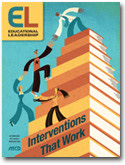As a psychologist who specializes in children with learning and attention disorders, I see a lot of kids who are struggling in school. I first saw Josh when he was an active, impulsive 5-year-old and diagnosed him with an attention disorder. He returned to me about 10 years later as he was about to begin high school. He had been a successful student through the 6th grade. In 7th grade, however, his academic performance began to decline, and he received his first F. At the beginning of 8th grade, his IQ was in the above average range, and his scores on measures of academic achievement were consistent with that. However, by the end of 9th grade, despite having a 504 Plan in place, Josh was failing most of his classes.
Tests given at Josh's school, as well as my own evaluations, revealed that Josh's cognitive skills were strong, and his academic abilities were certainly adequate for him to be able to achieve passing grades. But both his mother and several of his teachers reported that he had problems getting started on tasks, keeping track of everything he needed to do, sticking with tasks long enough to get them done, and breaking down long-term projects into subtasks and time lines. Josh admitted to having problems in all these areas. He said he didn't find the work difficult but often forgot assignments. He left long-term projects to the last minute, had difficulty estimating how long it would take to complete them, and couldn't always follow the project directions. He also didn't check his work for mistakes when he was done. Josh admitted he had huge problems with keeping his bedroom tidy and maintaining his notebooks for school. He lost things frequently, and his backpack was disorganized—and that backpack held all his work because he never used his locker.
Josh's mother saw these problems as stemming from his attention disorder. Teachers' comments on progress reports and report cards mentioned that Josh was frequently off task. On one of the rating scales completed for my evaluation, one teacher wrote that her biggest concern about Josh was "that he is lazy and not working to his potential."
Diagnosing the Problem
When you scan Josh's story, it sure looks like laziness. But there may be a better way to conceptualize his problems. Many students who are considered underachievers have a constellation of challenges that fall under the category of executive skills.
Executive skills are the cognitive processes required to plan and organize activities. These include the ability to initiate and follow through on tasks, a solid working memory and attention span, skills at performance monitoring, inhibition of impulses, and goal-directed persistence. Originating primarily in the prefrontal cortex (the part of the brain just behind the forehead), these skills begin to develop in some form soon after birth, but neuroscientists are now realizing that it takes a full two decades, if not longer, for them to fully mature.
Students who are deficient in these skills have trouble getting started on tasks, get distracted easily, lose papers or assignments, forget to bring home the materials needed to complete homework, or forget to hand in homework. They may make careless mistakes because they rush through work or dawdle until they run out of time. They don't know where to begin on long-term assignments, and they put the assignment off until the last minute, in part because they have trouble judging the magnitude of the task. Their work spaces are disorganized, and teachers may refer to their desks, backpacks, and notebooks as "black holes."
Josh's pattern is typical. Students with poor executive skills often navigate elementary school successfully—in part because teachers at that level provide developmentally appropriate support for immature executive skills. At the middle school level, two things happen that can be disastrous. First, changing classes and having multiple teachers with diverse expectations place a great deal of stress on already weak organizational systems. Second, the supports from both parents and teachers tend to drop off. Parents have trouble keeping tabs on their children's assignments, and teachers often expect students to develop their own organizational structures.
Solutions for Today and Tomorrow
The good news is that teachers can help decrease the likelihood that weak executive skills will derail students in the short term and help them improve their executive skills over the long term. Educators can adjust the classroom environment to reduce the impact of weak executive skills, teach students the missing skills, and use incentives to get students to use their executive skills.
The intensity of the intervention will depend on student needs. A Response to Intervention (RTI) model is an ideal framework for planning and implementing interventions. Teachers can support executive skill development at a whole-class (Tier 1) level by establishing classroom routines, teaching organizational skills, and building in fun activities to motivate students. Second-tier interventions are more suited to small groups of students who aren't succeeding once whole-class interventions are in place. At this level, teachers might provide weekly progress reports, plan small-group coaching sessions on executive skills, or work with parents to institute an at-home incentive program tied to regular progress reports. If a student doesn't respond to these strategies, it might be time for individualized (Tier 3) intervention, which would require parents, teachers, and the student to collaborate on an individual support plan. Figure 1 provides examples of strategies at all three levels.
Figure 1. Interventions for Developing Executive Skills
Lazy—Or Not? - table
Whole-Class (Tier 1) Interventions | Small-Group (Tier 2) Interventions | Intensive (Tier 3) Interventions |
|---|---|---|
| These strategies can help all students develop executive skills: Establish classroom routines for writing down assignments, for collecting homework, and so on. Make classroom rules, post them prominently, review them frequently, and role-play how to follow the rules. Establish electronic information systems in which students and parents can access assignment information and monitor student progress. Teach organizational skills, such as how to keep notebooks organized. Teach students such study skills as how to plan homework sessions and screen out distractions. Plan fun activities if the whole class achieves certain goals, such as popcorn parties on Friday if 80 percent of homework is handed in on time for the week. | Try these strategies with students who are still struggling after Tier 1 interventions are in place: Break the task into parts or make it less open-ended so students will know where to start. Establish after-school homework clubs. Provide weekly progress reports to parents. In small-group coaching sessions, teach students how to plan homework, develop strategies for remembering, and organize their notebooks. Institute peer-tutoring programs or train volunteer tutors. Ask parents to develop an at-home incentive system tied to daily or weekly progress reports. Have students come to the classroom during free time or after school to complete unfinished work. | If Tier 1 and 2 interventions don't help, parents, teachers, and students can work together to develop an individual support plan. Success is more likely if parents, teachers, and students all have specific responsibilities: Define the target behavior and criteria for success. Identify and implement specific environmental modifications, such as establishing a specific, distraction-free place and time to do homework every day. Explicitly teach, model, and rehearse the needed executive skills regularly. Have a teacher, parent, or coach check in with the student daily. Give the student a visual reminder of expectations. Monitor the student's independent use of the skill over time. |
Helping Josh
Josh's mother set up a meeting with staff from Josh's school to discuss the results of my evaluation and brainstorm ways to help Josh be more successful in 10th grade. Josh chose to come to this meeting and advocate for himself—not a response typically seen in a "lazy" student. We all agreed that Josh needed more intensive interventions than the whole-class and small-group interventions that his school had in place.
My primary recommendation was to provide Josh with a coach to help him stay on top of assignments, make good decisions about how to spend his time, and break down long-term assignments into smaller pieces. A typical daily coaching session for a student with organizational issues like Josh lasts 15–20 minutes. The student and coach review all homework assignments, including daily homework, upcoming tests, and long-term projects or papers; break down long-term assignments into subtasks with time lines; create a study plan for tests; make a homework plan for the day; monitor how well the student is following assignment plans; and track assignment completion.
Coaches typically check in with teachers at least weekly to track any missing assignments and to double-check long-term assignments. They may also e-mail parents on Friday informing them of any missing assignments. Ideally, coaching will include an instructional component so the student can gradually take on more tasks with less input from the coach.
Josh's school agreed to provide him with a coach who would meet with him during "E-block," a flexible time block his school offers at the end of the day in which students can receive extra help or retake classes they have failed. Josh meets with his coach during E-block for half an hour on Mondays through Thursdays. She has him go through his agenda book to make sure he's written down all his assignments, she works with him on a homework plan, and she helps him keep his notebooks organized so he doesn't lose assignments. She also checks in with his teachers regularly, and every Thursday she meets with Josh's mom.
When I asked Josh how he felt about this intervention, he said it was "kind of a pain" to have to put in extra time after school four days a week. But he readily admitted that he was doing better in school, earning mostly Bs. "Sometimes I slip down to Cs," he told me, "but then I work to bring the grades up."
He told me proudly that he'd earned a 98 and a 99 on the two tests he'd taken in his favorite class, ROTC. Last year, ROTC was the only class he earned an A in. This year, with coaching support, he was keeping the rest of his grades up—and he is on track to achieve his goal of joining the U.S. Army when he finishes high school. Last year, I heard determination in Josh's voice when he said he needed help to do as well in school as he thought he could. This year, I heard his pride as he recounted his success.
The Road to Success
The individual coaching Josh received is just one model. Some schools employ a group coaching model where resource room teachers meet with students at the end of the school day to make homework plans. There are peer-coaching models in which students work with a classmate to set goals for behavior during recess that focus on self-control and social skills. High schools can build a four-year program aimed at helping students with executive-skills issues achieve increasing independence around time and task management. In 9th grade, coaches might have students clean out their backpacks and get their notebooks organized. By 12th grade, students will only need occasional check-ins to make sure they're on track to pass their classes and complete their postsecondary plans.
One of my favorite comic strips drives home the importance of executive-skill development in school. The comic, F minus, is titled "Dale's 4th grade education pays off," and it depicts an individual being interviewed for a job. The interviewer is saying, "The job you are applying for will require you to know long division, state capitals, and cursive writing." Meeting content standards will only go so far in preparing students for life after formal education. They need executive skills, too.


